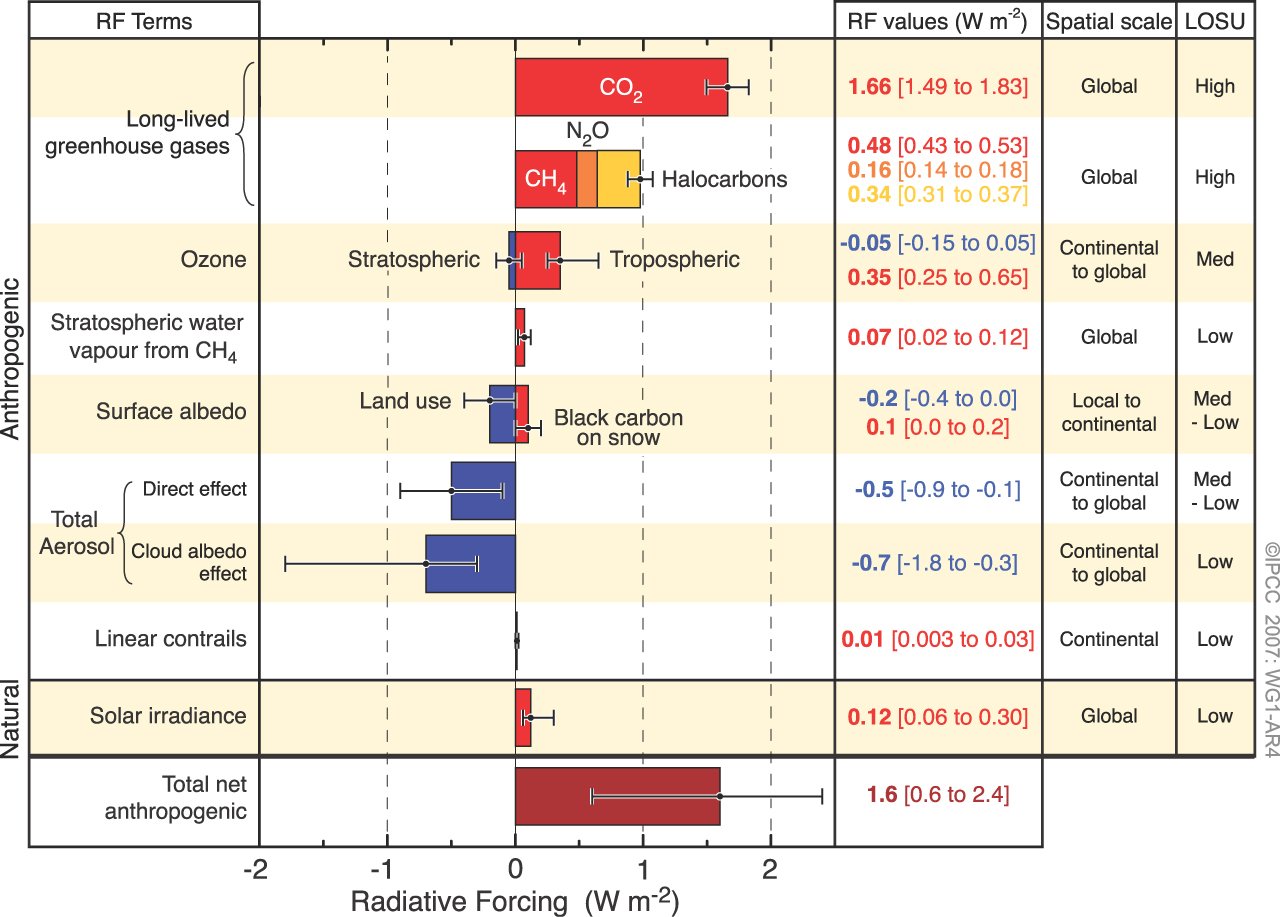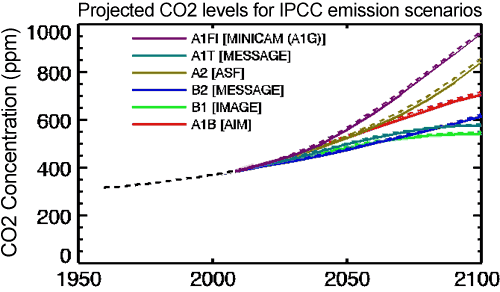Muller Misinformation #4: Time to Act
Posted on 20 April 2011 by dana1981
In a recent interview with National Public Radio (NPR), Dr. Richard Muller made the following statement, simlar to a statement he made in the recent U.S. Conressional hearing (emphasis added):
"An issue, though, that isn't really settled yet is how much of that is due to humans? And that's a subject that really can use more investigation...The global warming attributed by the IPCC, the big U.N. Council that makes this consensus report, attributes about half a degree, half a degree Celsius of warming to humans. But is it .4? Is it .3? If so, we have a lot more time. Is it .6 or .7? If so, we're in a big rush."
Estimating Anthropogenic Warming
Let's examine Muller's more optimistic scenario here. Under what conditions might human effects only be responsible for 0.3 to 0.4°C of the 0.8°C increase in average global surface temperature over the past century?
The impact of a certain effect on the global temperature depends on the radiative forcing (energy imbalance) it exerts on the climate, and the climate sensitivity (λ), which describes how much the temperature will change in response to a radiative forcing when accounting for feedbacks (i.e. changing levels of atmospheric water vapor or ice on the planet's surface).
Radiative Forcings
The IPCC Fourth Assessment Report provides us with a good summary of the various radiative forcings and their associated uncertainties:

Figure 1: Global average radiative forcing in 2005 (best estimates and 5 to 95% uncertainty ranges) with respect to 1750 (IPCC AR4).
The main radiative forcings are CO2 (1.49 to 1.83 Watts per square meter [W/m2]), other greenhouse gases (1.13 to 1.78 W/m2), and aerosols (-2.7 to -0.4 W/m2). Compared to these man-made forcings, the natural forcings over this same period are relatively very small. Of the 0.8°C surface warming over the past century, Muller suggests humans could be responsible for as little as 0.3°C. Considering the large size of the anthropogenic forcings, this supposition has two requirements to be true:
-
Climate sensitivity must be low so that the large man-made forcings have little effect on temperature, and/or
-
The aerosol forcing must be on the large (negative) side of the possible range of values, thus offsetting most of the greenhouse gas warming, and there must also be an unknown natural effect(s) causing even more warming than greenhouse gases.
Natural Warming Effects
Scientific observations and research have ruled out the main natural suspects (i.e. the sun and volcanoes) as significant contributors to the global warming over the past century, and especially over the past 50 years. Even though we are in a relatively high period of solar activity, the solar forcing is still 10 times smaller than the CO2 forcing alone. This is key – if humans didn't cause most of the warming over this period, there must be a 'natural' culprit.
Many "skepics" have rallied behind internal variability as their alternative hypothesis. However, as we recently discussed, studies have consistently shown that internal variability in general cannot account for more than 0.3°C warming over periods of several decades, and significantly less than that over the past 50 to 100 years. Moreover, natural variability cannot explain many of the observed 'fingerprints' of man-made warming.
The lack of a plausible alternative explanation for the warming over this period is a major flaw in the hypothesis that humans aren't driving global warming. It requires that:
-
The large energy imbalance from increasing greenhouse gases for some reason isn't causing much warming;
-
Some unknown natural effect we can't identify is somehow creating a larger energy imbalance than greenhouse gases; and
-
That unknown, unmeasured natural effect is warming the planet in exactly the same way as greenhouse gases would warm it.
Hypothetically, it's possible that this scenario is reality, but much less likely than Dr. Muller implies.
Climate Sensitivity
As mentioned above, the other variable relevant to determining the cause of a temperature change is the climate sensitivity parameter. Although there is a significant amount of uncertainty in this value, a broad range of estimates using many different lines of evidence can be combined to give us a plausible range. It can take several decades for the climate to fully respond to a large radiative forcing because most of the energy imbalance goes into the oceans, and water takes a long time to heat up. Thus in order to estimate how much the surface temperatures should have warmed so far given the current radiative forcings, we need to use the transient climate sensitivity, which the IPCC puts between 1 and 3°C for a doubling of CO2. This corresponds to a transient climate sensitivity parameter of 0.27 to 0.81 Watts per square meter per Kelvin.
Keep in mind that temperatures will continue to rise above the transient temperature until the planet reaches equilibrium. The transient temperature change represents approximately two-thirds of the eventual equilibrium temperature change.
Temperature Attribution
We now simply need to multiply the radiative forcings by the transient climate sensitivity parameter to evaluate how much warming they should have caused thus far.
| Effect |
Forcing (W/m2) |
Temp Change (°C) |
| CO2 | 1.49 to 1.83 | 0.40 to 1.48 |
| Other GHGs | 1.13 to 1.78 | 0.31 to 1.44 |
| Aerosols | -0.4 to -2.7 |
-0.11 to -2.19 |
If we look at just the warming effects, CO2 alone has caused at least 0.4°C warming already, and anthropogenic greenhouse gases at least 0.7°C. This is significantly larger than the minimum number (0.3°C) sugested by Muller as the potential human contribution to the global warming over the past century.
However, when we factor in the highly uncertain aerosol effects, the numbers become more muddled. It's possible that the cooling effects from human aerosol emissions could have offset most of the warming effects from human greenhouse gas emissions. But in this case we still run into the problem described above: if human effects aren't driving global warming, then what is, and why is it behaving exactly like human-caused warming would?
Muller's Optimistic Scenario
At the very least, human greenhouse gas emissions have generated 0.7°C warming of surface temperatures so far. Thus Muller's optimistic scenario in which humans have only caused 0.3 to 0.4°C warming implies a substantial cooling effect from human aerosol emissions. So in this optimistic scenario, is Muller right that "we have a lot more time" to reduce greenhouse gas emissions?
Unfortunately not. There are three important points to keep in mind:
1) Aerosols have a very short lifetime in the atmosphere, unlike CO2, much of which will stay in the atmosphere for centuries (Solomon et al. 2009), and globally there is significant effort to reduce aerosol emissions. Thus these aerosols only act to temporarily mask the greenhouse gas warming.
2) If Muller's optimistic scenario is correct and the aerosol forcing is offsetting most of the greenhouse gas warming, that also means there must be some other forcing as large or larger than the greenhouse forcing, causing most of the observed warming. However, observational data has ruled out the likely culprits such as the sun and volcanoes and internal variability. It is a very slim possibility, and not one we should bet our future on.
3) Approximately 33% of the equilibrium surface warming from the greenhouse gas emissions so far is still unrealized, but inevitable. Remember that at a minimum they've generated 0.7°C warming so far, which means that in the absolute best case scenario we're committed to at least 1°C warming, with 2°C considered the 'danger limit', and greenhouse gas emissions continuing to accelerate.
Even in Muller's unlikely optimistic scenario, we still don't have "a lot more time" to get our greenhouse gas emissions under control.
Running out of Time
Ultimately with what we know and the observational data we've obtained, we can say, as the IPCC did, that it's very likely (greater than 90% confidence) that most of the observed increase in global surface temperatures since the mid-20th century is due to human greenhouse gas emissions. We can also say that at best (or perhaps worst), aerosols are temporarily offsetting a significant amount of the well-known greenhouse gas warming, but that this is not a permanent solution, and that the greenhouse gas warming will only continue as emissions continue to rise and the planet continues toward equilibrium.
Even if the best case scenario is true, it does not mean "we have a lot more time," as Muller claims. For example, IPCC emissions Scenario A1T (approximately 580 ppm CO2 in 2100; Figure 2) assumes continued rapid economic growth, but a rapid transition in energy production away from fossil fuels such that global human CO2 emissions peak in 2040. Keeping greenhouse gases at these levels requires transitioning away from fossil fuels starting immediately.

Figure 2: Atmospheric CO2 concentrations as observed at Mauna Loa from 1958 to 2008 (black dashed line) and projected under six IPCC emission scenarios (solid colored lines). (IPCC Data Distribution Centre)
The IPCC also projects that other greenhouse gas emissions will continue to increase, whereas aerosol emissions will decrease. Thus even in this scenario where we take major steps to reduce emissions immediately such that they peak in 2040, even if climate sensitivity is toward the low end of possible values (~1.5°C for a doubling of CO2), by 2100 we will have committed ourselves to 2°C warming above pre-industrial levels (the danger limit).
The key that Muller is missing is the extreme degree of our reliance on fossil fuels and the magnitude of the effort required to change that. If we could just flip a switch and turn off greenhouse gas emissions, we would have a lot more time. Unfortunately, reality is not so simple.
More important than the warming we have caused so far is the warming we are committing ourselves to in the future, which is already approaching dangerous levels, and may be on the verge of surpassing them (Arora et al. 2011). Our time is quickly running out even in the most optimistic scenarios, and it is very important not to fool ourselves into thinking otherwise.
Although this particular statement by Muller was not a major error, particularly in comparison to some of his other recent statements (see Muller Misinformation #1, #2, and #3), it pertained to arguably a much more important subject. Many of our policymakers are looking for any excuse not to take action to slow climate change, and making careless statements which can provide them with those excuses is a mistake.































 Arguments
Arguments






























Gilles wrote : "18 : No it's not logical - If it is not easy to stop smoking, it's difficult, and success is not granted."The last off-topic comment from me - can't guarantee that this will be the case for others, of course ! It is very logical. You want to stop : you stop. I did so five years ago, after 20 years as a smoker. It was the logical thing to do, I did it. End of story.